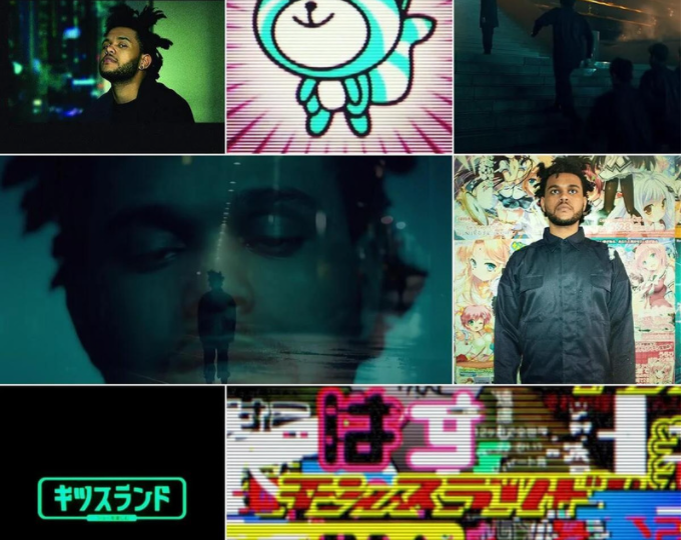Japanese music has had a significant impact on American hip hop music over the years. From city pop to alternative hip hop, American artists have been inspired by the sounds of Japanese musicians. With the advent of digital production and the renewed popularity of sampling in mainstream music, the use of Japanese samples has become increasingly common in American hip hop. The sounds of traditional Japanese composition, as well as the incorporation of obscure Japanese tracks, can be heard in many modern hip hop songs.
One of the most striking examples of this fusion of cultures is the recent album by The Weeknd, “Dawn FM“. This album, which is influenced by 80s R&B, features a sample from Japanese city pop artist Tomoko Aran. This sample showcases the unique sonic atmosphere created by the combination of Japanese and American cultures.


The use of Japanese samples in American hip hop music creates a sound that is both distinct and memorable. The themes and language of hip hop are incredibly different from traditional Japanese music, but when combined with the sounds of nostalgic Japanese instrumentals, they produce a unique character that is unlike anything else in music.
One of the reasons why Japanese samples are so prominent in American hip hop music is due to the long-held conventions of traditional Japanese composition. These conventions, which include the use of specific instruments and melodies, have been a major influence on the hip hop genre for many years. Many rappers and producers have adopted these elements into their own music, creating a sound that is both contemporary and nostalgic.
However, not all Japanese samples in American hip hop are immediately recognizable as such. Some of the samples feature deep cuts from Japanese music that may go unnoticed even by the most observant listeners. This makes the use of Japanese samples in American hip hop all the more interesting, as it shows how different cultures can come together to create something truly unique and special.
In this article, we showcase some of the most intriguing uses of Japanese samples in American hip hop, highlighting the unique fusion of Japanese and American cultures and the impact it has on the genre. Join us as we delve into the influences and styles that rappers in the West have adopted from Japanese musicians.
SAKURA SAKURA
THE EAST FLATBUSH PROJECT – TRIED BY 12
Going back in time to 1996, The East Flatbush Project dropped a banger that blended Japanese and American culture in a unique way. “Tried by 12” took the timeless melody of the traditional Japanese folk song “Sakura Sakura” and transformed it into a head-banging hip hop beat, with the prominent Japanese strings adding a nod to the rich musical culture of Japan. The producer Spencer Belamey worked his magic, flipping the string koto sound into a heavy boom bap rhythm that had listeners feeling the East-meets-West vibes.
YELLOW MAGIC ORCHESTRA – COMPUTER GAME
DE LA SOUL – BIG BROTHER BEAT
Later that same year, De La Soul came out with “Big Brother Beat” which featured Mos Def and was produced by the well-known jazz rap producer, Skeff Anselm. Anselm used the classic tune “Computer Game” from the legendary group Yellow Magic Orchestra to make a funky, electrifying beat that was quintessentially De La Soul.
YELLOW MAGIC ORCHESTRA – RAP PHENOMENA
J DILLA – GO GET EM
J Dilla, the late king of alternative hip hop production, put his spin on Yellow Magic Orchestra’s “Rap Phenomena” in the purely instrumental banger “Go Get Em”. He masterfully intertwined YMO’s electronic vibes with his signature J Dilla kicks, striking a harmonious balance between both artists’ unique sounds.
HI-FI SET – SKY RESTAURANT
J COLE – JANUARY 28
J Cole hits it out of the park on his multi-platinum album 2014 Forest Hills Drive, showcasing his skills as both a sharp lyricist and a mastermind producer. The track “January 28” sets the tone for the album with its powerful beat, built on a sample of Hi-Fi Set’s “Sky Restaurant”. J Cole loops the emotional vocals into an impactful rhythm, complete with aggressive drums that immediately draw the listener in. This track proves that J Cole is a true talent who knows how to turn a simple sample into something truly unforgettable
MAI YAMANE – TASOGARE
YOUNG NUDY, PLAYBOI CARTI – PISSY PAMPER
In 2019, Young Nudy and Playboi Carti burst onto the Soundcloud trap scene with their hit single “Pissy Pamper“, also known as “Kid Cudi”. Despite being unreleased due to sample clearances, the track features a loop of the opening seconds of Mai Yamane’s “Tasogare”. Masterminded by frequent collaborator Pi’erre Bourne, “Pissy Pamper” melds the otherworldly sounds of Yamane’s composition with Carti’s trippy trap vocals to create a minimalist, yet futuristic beat that still resonates three years later.
CHRISTOPHER TIN – MADO KARE MIERU
TYGA – CARELESS WORLD
In the early 2010s, Tyga and his label Young Money Cash Money Billionaires were ruling the rap game and his album “Careless World: Rise of The Last King” was a hallmark of the era. The title track, produced by Lil Wayne, Birdman, and Ronald “Slim” Williams, was an intro to the album and featured a sample from composer Christopher Tin’s “Mado Kara Mieru.” The piece, sung by Aoi Tada, Kaori Omura, and Lia, showcases traditional haiku lyrics over Tin’s lush orchestral arrangement. The elegant vocals and instrumentation stand in sharp contrast to Tyga’s braggadocious rhymes, declaring himself a king in a chaotic world.
TAZUMI TOYOSHIMA – TOMADOI TWILIGHT
JEEZY – SEEN IT ALL
The year 2014 saw Jeezy’s release of “Seen It All: The Autobiography”, his seventh studio album. Its title track, “Seen It All,” caught everyone’s attention thanks to Jay-Z’s incredible feature and Cardo’s innovative production that used a smooth sample of Tazumi Toyoshima’s “Tomadoi Twilight,” a rare late 70s pop ballad that blends city pop elements and traditional Japanese sounds.
GEINOH YAMASHIROGUMI – ILLUSION
DANNY BROWN – FIELDS
Producer Paul White, from South England, added a surreal touch to Danny Brown’s “Fields” by sampling the trippy “Illusion” from the Akira soundtrack. The vocals and winds from the 15-minute song, which is inspired by traditional theater music, can be found in the song’s hook. Paul White expertly weaved together multiple samples, as he is known to do, to create a captivating track.
SAI YOSHIKO – TAIJI NO YUME
BENNY THE BUTCHER, HARRY FRAUD – PLUG TALK
On “Plug Talk” from The Plugs I Met 2, producer Harry Fraud paired up with Griselda Records’ Benny the Butcher and utilized the 2008 ballad “Taiji no Yume” by Japanese singer/songwriter Sai Yoshiko. The sample, which features Yoshiko’s emotive singing, perfectly complements Benny and 2 Chainz’ reflective lyrics about their experiences growing up in the crack scenes of Buffalo, New York and Atlanta, Georgia.
HATSUNE MIKU – DATA 2.0
BIG BOI – KILL JILL
In 2017, Big Boi of the legendary group Outkast dropped the banger “Kill Jill” featuring Jeezy and Killer Mike, as a single from his album “Boomiverse”. The track was masterfully crafted by Atlanta production legends Organized Noize, who have been working with Big Boi since the early Outkast days. The song features prominent samples from Hatsune Miku’s “DATA 2.0,” with the first 30 seconds showcasing Hatsune Miku’s solo vocals brilliantly intertwined with the drums.
KIRORO – MIRAI HE
LIL PEEP – LIL KENNEDY
“Lil Kennedy”, a heart-wrenching emo rap tune from the late Lil Peep, hit the Soundcloud scene in 2016 and skyrocketed Peep’s stardom. The track opens up about Peep’s struggles with addiction, over a beat crafted by the renowned producer Nedarb Nagrom. The beat, featuring a sample from the contemporary piano ballad “Mirai He” by Kiroro, serves as the perfect backdrop for Peep’s raw and emotional lyrics about the challenges of letting go.
JUNKO OHASHI – I LOVE YOU SO
NO REGRETS – SMOKE DZA
Smoke DZA, Dom Kennedy and Harry Fraud teamed up for the feel-good hit “No Regrets” in 2021. This banger showcases their love for city pop, grooving to the silky sounds of Junko Ohashi’s “I Love You So”. With its funky 80s-inspired winds and drum machine beats, paired with the duo’s smooth rhyming, “No Regrets” is a dreamy ode to the art of letting go and living life without any regrets.
Samples serve as a musical gateway, bringing fresh tunes to fans through familiar artists. With the increasing prevalence of these samples in today’s music, Japanese tracks are set to soar in international popularity.
With their distinct sound and instrumentation, these samples are ushering in a new era of music. As the world uncovers Japan’s hidden musical gems from yesteryear, these artists’ works will continue to be treasured by future generations around the world.

